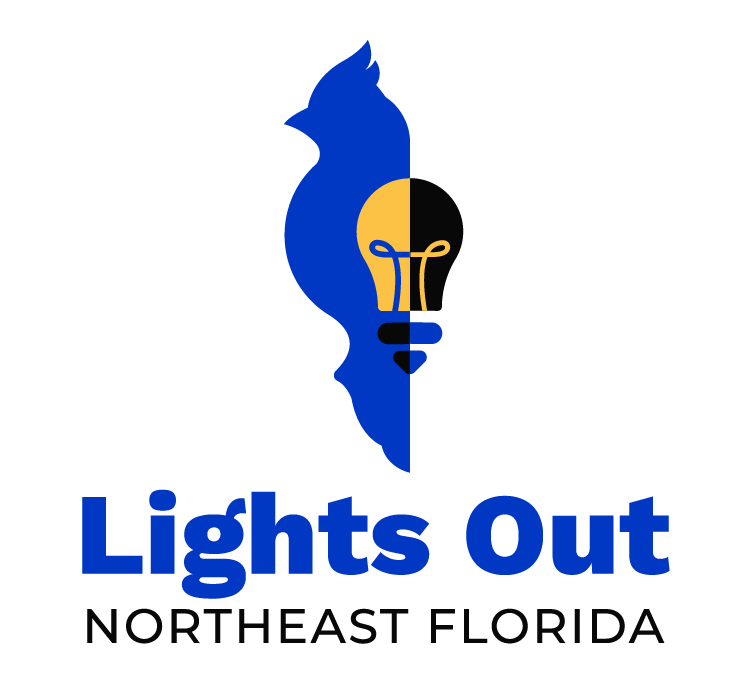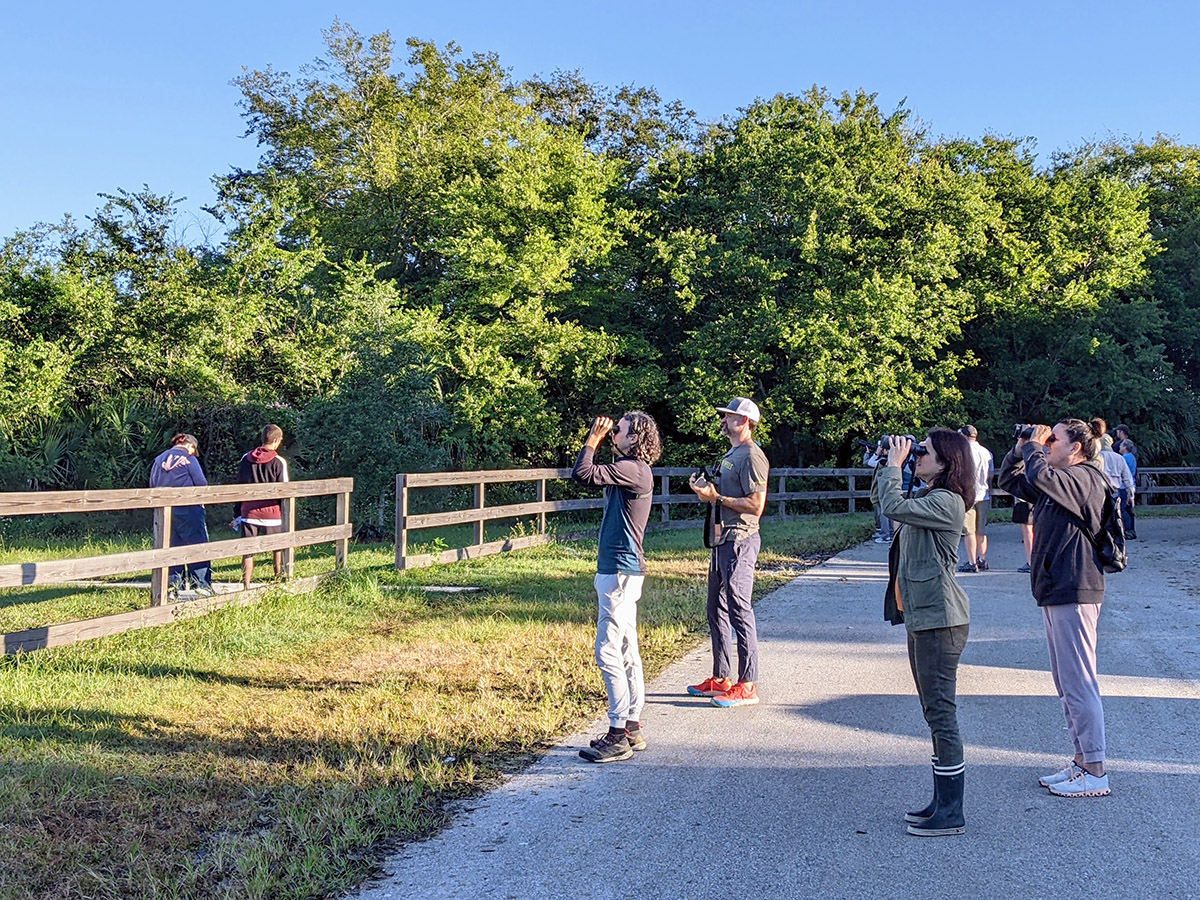The Audubon Observer, March 2025
|
|
||||
LOVE YOUR BIRDS: BIRD-FRIENDLY WINDOW ART CONTEST
2025 marks year five of window collision monitoring during the spring and fall migration seasons, and project leaders have already been super busy this year making connections with government representatives, business owners, schools, and community members. LONF has partnered on bird-friendly window projects at MOSH as well as local schools, and chapter volunteers have been spreading the word at community events about turning lights off at night and making windows safe for birds during migration season.
The Love Your Birds: Bird-Friendly Window Art Contest is open to all residents of Clay, Duval, or Nassau County in Northeast Florida. Designs must be applied to the outside surface of the window and should leave no more than 2” of open space at any point on the window. The contest opens on March 1, 2025 and closes on May 15, 2025, and the winner will be announced on June 1, 2025. We can’t wait to see your Bird-Friendly Window Artwork! RIVERSIDE PARK NESTING BIRDS NEED YOUR HELP!
We are so grateful for the contributions of our partners in this nesting bird protection project. The City of Jacksonville Parks and Recreation Department has been super helpful and provided the caution tape as well as signs advising park visitors not to feed the birds. The Friends of Riverside Park community organization has been advocating for improvements at the park for several years to help provide a safe and nurturing environment for the birds and park visitors alike. Park stewards Maggie Theoni and Cindy Corey continue to provide invaluable "boots on the ground" support. Please join us at the park from 9 - 11 am on Saturday, March 15th for a park cleanup event sponsored by the Friends of Riverside Park! We'll be there to spread awareness about the birds and why they need to be protected, with fun activities for both children and adults. We are also looking for additional volunteers to help protect the nesting birds. To learn more, please reach out to me at Elizabeth.filippelli@duvalaudubon.org. HOW TO BE AN ETHICAL BIRDER The popularity of birding has seen incredible growth in recent years. According to the National Audubon Society, an estimated 96 million adults in the U.S. (that’s more than a third of the entire U.S. adult population) are now enjoying the hobby. That’s no surprise to those of us who have been birdwatchers for years; we well know the benefits of spending time in nature and observing the beauty of birds and their fascinating behaviors. Recent research has shown that watching birds can reduce stress, relieve anxiety, and increase feelings of happiness and well-being. With so many people now experiencing the joys of birding, it’s more important than ever to make sure that we are not causing any disturbance or harm to the birds in the process. Many bird species are threatened or at risk of extinction due to habitat loss, predation by non-native animals like domestic cats, extreme weather and food availability disruptions due to climate change, collisions with reflective windows, and light pollution. With all these threats that birds must already deal with, disturbance from birders and bird photographers is the last thing they need. Here are some tips to make sure you aren’t causing any harm when you are enjoying the birds we all love:
Avoid or eliminate the use of recorded calls or pishing. A longstanding practice of birders has been to play a recorded call or “pish” (making sounds similar to avian alarm calls) to get a bird to come closer to investigate the sound. However, research suggests that the use of playback may be detrimental to birds, especially during migration or breeding season. Just like getting so close to a bird that it interrupts whatever they’re doing, using playback and pishing can cause them to use up unnecessary energy. If you feel it’s absolutely necessary to use playback or pishing to be able to “get” a bird, please make sure not to do that in any of the above circumstances and use it extremely sparingly. Remember, others may be using playback or pishing in the same spot during the same day; think of the energy the poor bird could be wasting on fake competitors or predators, energy they may need just to survive. Also keep in mind: the use of playback is strictly prohibited in national parks and national wildlife refuges. Practice respect. Respect property rights and don’t enter private property without permission from the owner. Respect others by treating anyone you encounter with kindness and courtesy. Respect birds and other wildlife by leaving dogs at home when you’re out birding (and keeping cats indoors, always).
Support conservation efforts. Organizations like Audubon, the American Bird Conservancy, the Cornell Lab of Ornithology, and many others are doing important work researching threats to birds and changes in bird populations worldwide, and making public policy recommendations to make sure birds continue to have the protections and habitat they need to survive and thrive. Closer to home, Audubon Florida and your local Audubon chapters are educating the community about birds and the threats they face, planting native plants to support birds, and working to conserve natural areas. Supporting these and other conservation groups will help ensure that the birds we all love so much will be around for future generations to cherish. UPCOMING ACTIVITIES Here's what's happening this month:
JaxParks hosts many events for nature lovers, too! Click here and select EVENT CALENDAR to learn more. Duval Audubon Society, Inc.
|
||||



 Now is the time to make sure the windows at YOUR home or business are bird-friendly! To a bird, a reflection in a window looks just like open sky or a branch on a tree; they can’t tell that it’s a solid surface and may fly right into it, risking serious injury or even death. Luckily, it’s easy to make your windows safe for birds, and there are
Now is the time to make sure the windows at YOUR home or business are bird-friendly! To a bird, a reflection in a window looks just like open sky or a branch on a tree; they can’t tell that it’s a solid surface and may fly right into it, risking serious injury or even death. Luckily, it’s easy to make your windows safe for birds, and there are  Starting March 1st, pick a window (or two, or three!) at your home or business that could present a reflection hazard to birds, and draw or paint a design on the outside of that window to break up the reflection. Remember, whatever pattern or design you apply should leave no more than 2” of open space at any point on the window to be sure that tiny birds like gnatcatchers or hummingbirds are protected (see example design, above). Media like tempera paints, liquid chalk markers or even soap are more temporary and can easily be washed off at the end of migration season (generally late May), but you might also want to consider a more permanent application like china markers, oil-based paint markers, or paint pens. That way, you won’t need to reapply when the fall migration season comes around.
Starting March 1st, pick a window (or two, or three!) at your home or business that could present a reflection hazard to birds, and draw or paint a design on the outside of that window to break up the reflection. Remember, whatever pattern or design you apply should leave no more than 2” of open space at any point on the window to be sure that tiny birds like gnatcatchers or hummingbirds are protected (see example design, above). Media like tempera paints, liquid chalk markers or even soap are more temporary and can easily be washed off at the end of migration season (generally late May), but you might also want to consider a more permanent application like china markers, oil-based paint markers, or paint pens. That way, you won’t need to reapply when the fall migration season comes around. Once you have your artwork drawn or painted on the outside of your window, take a photo and send it to Duval Audubon Society board member Sabrina Lehmann at
Once you have your artwork drawn or painted on the outside of your window, take a photo and send it to Duval Audubon Society board member Sabrina Lehmann at  Nesting season has begun at Jacksonville's
Nesting season has begun at Jacksonville's  Keep your distance. No matter what a bird is doing, it’s likely to be something it needs to do to stay alive or bring up healthy chicks. This is true especially for migrating birds, who are literally living on the edge during their entire migration journey. Birds need to be able to rest, forage for food, keep their plumage clean, and stay hydrated in order to survive. If a bird changes its behavior because you are trying to see it or photograph it, you are TOO CLOSE. That bird just expended unnecessary energy reacting to you. Use binoculars, a scope, or a telephoto camera lens to get a good look at it instead of trying to get up close and personal.
Keep your distance. No matter what a bird is doing, it’s likely to be something it needs to do to stay alive or bring up healthy chicks. This is true especially for migrating birds, who are literally living on the edge during their entire migration journey. Birds need to be able to rest, forage for food, keep their plumage clean, and stay hydrated in order to survive. If a bird changes its behavior because you are trying to see it or photograph it, you are TOO CLOSE. That bird just expended unnecessary energy reacting to you. Use binoculars, a scope, or a telephoto camera lens to get a good look at it instead of trying to get up close and personal. Keep feeders and birdbaths clean. If you provide food and water for birds, make sure to clean feeders and birdbaths regularly to prevent the transmission of disease. (
Keep feeders and birdbaths clean. If you provide food and water for birds, make sure to clean feeders and birdbaths regularly to prevent the transmission of disease. ( Bird Walk for Beginners @ Fort Caroline National Memorial
Bird Walk for Beginners @ Fort Caroline National Memorial